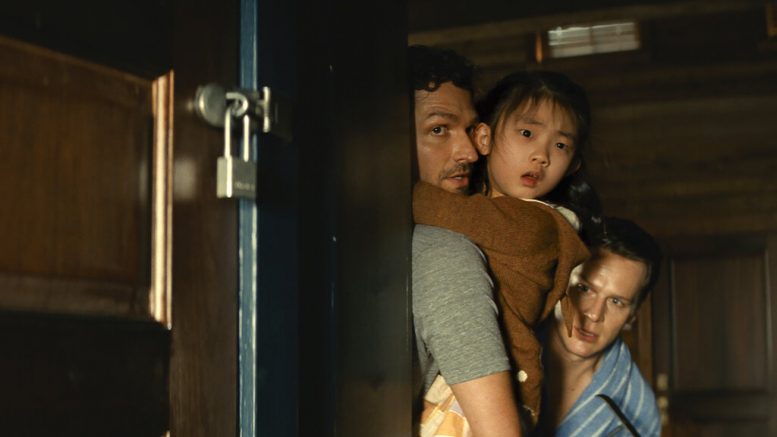The Associated Press
Knock. Knock.
It being mid-winter (typically a doldrums in movie theaters), it’s a cozy relief to be able to throw open the door and find M. Night Shyamalan standing there with his near-annual helping of high-concept thriller. His last one, “Old,” about vacationers trapped on a private beach where aging is accelerated — a kind of high-speed “White Lotus” — fittingly arrived in the summer. But this quieter, gloomier time of year seems perfectly designed for Shyamalan to burst in with his signature brand of big-screen bonkers and some new twists to the age-old question of “Who’s there?”
“Knock at the Cabin,” which opens in theaters Friday, is at once like every previous Shyamalan film and a thrilling departure. Gimmicky set-up? Check. Queasy spiritualism? You bet. But as a self-contained, handsomely staged thriller — after the knocking, the film takes place almost entirely within a remote cabin — Shyamalan’s latest finds the filmmaker working in an appealingly straightforward and stripped-down fashion.
We have our cabin, our small cast of characters and, above all, our preposterous premise. Though Shyamalan’s films often flirt with higher powers and existential conundrums, nothing reigns in his movie universe more than The Concept. And in the gripping “Knock at the Cabin,” he carefully teases it, exploits it and dutifully follows it to its ultimate conclusion with the command of a seasoned professional.
Just outside a cabin in a wooded forest, 7-year-old Gwen (Kristen Cui) is collecting grasshoppers in a glass jar. “I’m just going to learn about you for a while,” she tells one as she slides it into the jar. Shyamalan, too, is gathering specimens into a hermetically sealed vessel for inquiry. One calmly walks right out of the woods. A hulking, bespectacled man (Dave Bautista) strides up to Gwen, politely introduces himself as Leonard and makes kindly chit chat while occasionally glancing back over his shoulder. Then he says the reason he’s there makes him heartbroken. He describes it as “maybe the most important job in the history of the world.”
Before you exclaim “Podiatry!” Leonard’s job turns out to be a tad more sinister. He and three others, who soon also emerge from the forest, are there, as Leonard patiently lays out, to give Gwen’s parents a choice that will dictate the fate of the world. After forcing their way into the cabin, Leonard — flanked by Sabrina (Nikki Amuka-Bird), Redmond (Rupert Grint) and Adriane (Abby Quinn) — informs Gwen’s two dads, Eric (Jonathan Groff) and Andrew (Ben Aldridge) — that they must make a sacrifice to stave off global apocalypse. Each has come to the cabin after all-consuming visions — like warped versions of those that preoccupy the characters in “Close Encounters of the Third Kind” — of the doom that awaits if the family in this random cabin doesn’t, within hours, kill one of themselves.
This isn’t, like last year’s “Barbarian,” another chastening example of the dangers that lurk within the poorly chosen Airbnb, (though I, for one, will henceforth not be clicking “Shyamalanian allegory” in all future bookings). This is, like most of Shyamalan’s schemes, a sincere metaphorical proposition. What’s more important: Preserving one’s family or the larger world?
There are, of course, reasons to be dubious of strangers who turn up in your vacation rental asking for blood to spare humanity. Are they delusional? Has this gay couple been targeted? Do their demands not sound a little like the nuttery of some of today’s real-world attackers? Eric and Andrew sense the same kind of brutality that they’ve experienced all their lives as gay men. Flashbacks to their past, including moments of bliss and pain, suggest this lurid episode is part of a larger narrative of a loving family forged against a harsh world. “Always together” is the couple’s mantra.
But the way the four intruders speak is at odds with that possibility. They seem genuinely concerned for the wellbeing of the family. They identify themselves as regular people, some with families of their own, who are reluctantly but necessarily carrying out a duty. They are making their own sacrifice, too. Bautista, in one of his finest performances, is more sweet than menacing, even while wielding a heavy weapon. Amuka-Bird, too, is an affectingly sensitive presence.
The performances, all around, are convincing, and Shyamalan arrestingly stages the intense standoff as blood begins to spill and calamities, seen on television, mount. The tale, adapted from Paul G. Tremblay’s 2018 novel “The Cabin at the End of the World” with a notable tweak to the ending, cleverly inverts the home invasion thriller.
There are, undoubtedly, deeper avenues of exploration left unexamined. But there are also B-movie pleasures that deviate from horror convention, and even some of the director’s own trademark sensibilities. Shyamalan doesn’t pump up the violence, nor does he rely on plot twists to carry “Knock at the Cabin” along. Instead, the film works as a brutal, neatly distilled kind of morality play that toys with fatalism, family and climate change allegory. What most distinguishes Shyamalan’s film is how it dares to consider whether some things are more important than family. In apocalyptic big screen spectacles, family is almost always the last and most abiding refuge. Here, it may be an impediment.
“Knock at the Cabin,” a Universal Pictures release, is rated R by the Motion Picture Association for violence and language. Running time: 100 minutes. Three stars out of four.




































